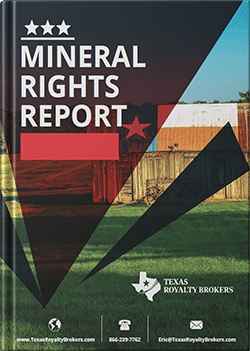Why Texas Royalty Brokers?
sellers
Buyers
State Specific Guides
Resources
Inherited Mineral Rights: What They’re Worth and What to Do Next
If you’ve recently inherited mineral rights, you might be wondering what to do next. You’re not alone.
Mineral rights can be one of the most confusing assets to inherit. At the same time, they can also be one of the most valuable.
Whether these rights have been in your family for years or you just found out you own them, you may be sitting on an asset with significant potential.
The challenge is knowing what you have and what to do with it. Inherited mineral rights can come with royalty income, leasing opportunities, or legal paperwork that needs to be sorted out. It is easy to feel overwhelmed when terms like “division orders,” “pay status,” or “suspense funds” start popping up.
That is where this guide comes in.
We are going to walk you through what it means to inherit mineral rights, the steps you need to take, how to understand their value, and how to make informed decisions.
Most importantly, we’ll explain how Texas Royalty Brokers can help you get the most money with the least amount of stress if you decide to sell.
Before we dive into the step-by-step process, it helps to understand exactly what you’ve inherited.
What Does It Mean to Inherit Mineral Rights?
Mineral rights ownership is when you own the minerals beneath the surface of a piece of land.
These minerals could include oil, natural gas, or other resources. In Texas and many other states, the mineral rights can be completely separate from the surface rights. This means you can own the minerals without owning the land above them.
When you inherit mineral rights, you are taking over legal ownership from a previous owner. That person may have had an active lease in place, been receiving royalty income, or simply held the rights without any activity.
There are generally three categories of inherited mineral rights:
-
Producing: Oil or gas is currently being extracted, and royalty checks are coming in.
-
Leased but not producing: There is a lease in place with an oil or gas company, but nothing is being produced at the moment.
-
Non-leased and non-producing: The rights are not leased, and there is no current production. These might not generate income right now, but they can still hold value depending on location and future drilling activity.
You may also inherit only a portion of someone’s mineral rights. It is common for rights to be divided among siblings, cousins, or other heirs, which can make ownership a little more complicated.
The key takeaway here is that inheriting mineral rights means you now have legal control over something that could bring in income or be sold for a lump sum. Understanding the status and value of what you inherited is the first step, and that is what we will cover next.
What to do after you inherit mineral rights?
There are a few things you should do after inheriting mineral rights.
Step 1: The first thing you need to do is complete the process of getting the mineral rights put in your name legally. Typically this is done through the probate process or through an attorney if there was a will. This is an important step because your hands will be tied until the ownership is legally in your name. Important: Make sure that a document is filed in the county where the mineral rights are located showing that you are the new owner. An attorney can assist you with this.
Step 2: Determine the status of the mineral rights. The mineral rights could have 3 different statuses:
Non-leased / Non-producing: This means the mineral rights are not currently leased, and also not producing any type of royalty income. Generally speaking, this means the mineral rights are not going to have any value currently. There is nothing to do if the mineral rights are not leased or producing.
Leased: The best way to determine if the mineral rights are currently leased it to check on Texas File. You will want to search in the county where the mineral rights are located and see if any documents have been filed within the last 10 years. On Texas File, you will search the name of the person you inherited from. Look for any document titled “Lease Agreement” or “Memo for Lease”. Any document that is related to an oil and gas company in the last 10 years would be worth getting for your records. If you don’t see any documents filed within the last 10 years, there is not active lease unless the mineral rights are held by production (currently being paid royalties). If the mineral rights are leased, it means you could get royalty income in the future.
Producing: If there is current royalty income being paid either monthly or every few months, these are producing mineral rights. The best way to determine this is to check the bank statements for you relative and see if any money was being received. Another alternative is to search their name on Mineral Holders. If their name shows up on mineral holders, this will determine they have been getting royalties and it will tell you the location and operator.
Pay Status: If the mineral rights are producing, you will need to get the ownership transferred into your name. Contact the operator (company paying royalties) and speak to their “Division Orders” department. They will start the process of transferring the ownership into your name so you can start getting paid the royalty income.
Suspense: When you contact the operator, ask the company if there is any money being held in suspense. If there was royalty income being generated, but payments stopped because the owner was deceased, that money will be collect and placed into suspense. If there is money in suspense, ask them how much. Once you are put into pay status, your first royalty check will include all the money held in suspense.
Escheatment: If there was money held in suspense, some money may have also be escheated to the state. This is also known as “unclaimed property.” After a few years, any money held in suspense must be sent to the state. You can check under your name and the name of the person you inherited from at the Texas Unclaimed Property website.
Step 3: Determine whether you want to sell the mineral rights or hold onto them. Deciding whether to sell mineral rights is a personal decision. Check out our article that covers the reasons to sell mineral rights.
Step-up Basis for inherited Mineral Rights
It’s important to understand step-up basis for inherited mineral rights.
The decision to sell mineral rights or hold onto them may come down to your step-up basis.
The reason step-up basis is important for inherited mineral rights is that it determines how much you will owe in taxes. When you inherit mineral rights in Texas, you get a step-up basis.
How does step-up basis work for mineral rights?
A step-up basis means that you get to use the market value of the mineral rights when you inherited them as your basis.
Wait, what is a basis? A basis for tax purposes is how much you paid for the mineral rights. Wait a second, I didn’t pay for them. Correct. That is what step-up basis is. It lets you take the market value at the time of inheritance and treats it as if you had purchased the property for that price. This is where the tax benefit comes in.
Let’s imagine you bought a house for $500,000. Your basis in the house is $500,000 because that is what you paid for it. If you sold it for $600,000, you would only pay taxes on the gain of $100,000 (sales price – basis = taxable amount).
Let’s imagine your uncle purchased a home for $250,000. When they passed away, that home was worth $500,000 and you inherited the home. Even though you didn’t pay anything for the home, the step-up basis tax rule allows you to have a basis of $500,000 in the home (market value when inherited).
It works the same way in mineral rights. Regardless of what the family member paid for the mineral rights, your step-up basis in mineral rights is the market value at the time you inherit them.
How to determine market value when inherited?
As we have discussed, it is impossible to know mineral rights value until you sell. If it’s impossible to know the value until you sell, how can you determine the market value when you inherited? By working backwards.
The only way to determine the step-up basis of inherited mineral rights is at the time of the sale. Once you have a current market sales price, you can use the inflation adjusted price of oil to determine your basis.
Visit Inflationdata.com to view the inflation adjusted price of oil.
How does that work exactly? Let’s look at an example.
Example of step-up basis for inherited mineral rights
Let’s assume that you inherited mineral rights in 2018. Looking at inflationdata.com, we see that the inflation adjusted price of oil was $63.10 in 2018. Let’s assume that the price of oil when you sold was $80. Let’s also assume that the sales price is $1,000,000.
To determine your step-up basis, we use the sales price, current price of oil ($80/barrel), and inflation adjusted price of oil in 2018 ($63.10).
$1,000,000 sales price
X 78.875% (63.10 / 80)
= $788,750 your basis
$1,000,000 (sales price) – $788,750 (basis) = $211,250 (amount you owe taxes on)
Let’s assume a 20% capital gains tax rate. This means you would owe taxes on 20% of $211,250 or $42,250 in taxes. That sounds like a lot in taxes, but this is actually just 4.2% of the total sales price of $1,000,000.
Note: Inflationdata.com is always updating the inflation adjusted column, so the numbers may not match up perfectly.
Disclaimer: Speak with a CPA
We highly recommend speaking to your CPA. The IRS has given no official guidance on how tax basis for mineral rights should work. We believe that looking at the inflation adjusted price of oil at the time of sale is the most accurate way possible, but it is ultimately up to your CPA to determine the correct way to handle step-up basis for mineral rights.
Common Mistakes People Make with Inherited Mineral Rights
Inheriting mineral rights can feel like a blessing, but it can also lead to trouble if you don’t handle them correctly.
We see a lot of people make the same mistakes after inheriting mineral rights, and unfortunately, those mistakes often lead to missed income or undervaluing the asset. Here are the most common things to watch out for.
1. Failing to transfer ownership properly
The most important first step is making sure the mineral rights are legally transferred into your name. Until that happens, you won’t be able to sign leases, receive royalty payments, or sell the rights. Too often, people assume the inheritance is automatic and never complete the legal steps through probate or an attorney. Even if there is a will, proper documents still need to be filed in the county where the minerals are located.
2. Not checking for suspended or unclaimed funds
If the mineral rights are producing, there is a good chance some royalty income is being held in suspense or may have been sent to the state as unclaimed property. Many heirs never think to check for these funds and leave thousands of dollars behind. Be sure to contact the operator and also search the Texas Unclaimed Property website for both your name and the name of the person you inherited from.
3. Making decisions without knowing the value
Too many mineral owners sell without knowing what their rights are worth. This often happens when they receive an unsolicited offer in the mail or get a call from a mineral buyer. Selling without understanding value is the fastest way to leave money on the table. The mineral rights market can be competitive, and you owe it to yourself to get multiple offers through a professional mineral rights broker who knows how to position your property.
4. Holding onto the rights without a plan
On the flip side, some people assume they should always hold onto mineral rights “just in case.” The reality is that if the mineral rights are non-producing and not located in an active area, they could sit dormant for decades. If there’s no lease and no activity on nearby land, the value may not improve anytime soon. This is why it’s important to evaluate your rights with someone who understands current market conditions.
Avoiding these common mistakes can save you time, money, and frustration. If you are unsure where to start, Texas Royalty Brokers can help you get clarity and avoid costly missteps.
How to Value Inherited Mineral Rights
Figuring out what inherited mineral rights are worth can be tricky, especially if you’ve never dealt with them before. Unlike a house or a car, mineral rights don’t have a fixed price. Their value depends on a mix of factors that change over time.
Here’s what affects the market value of inherited mineral rights.
1. Location
Just like real estate, location is everything in mineral rights. Rights located in active oil and gas regions like the Permian Basin or Eagle Ford Shale are typically more valuable than those in areas with little or no drilling activity. If your mineral rights are in a hot area, there may already be demand from buyers and operators.
2. Production status
Producing mineral rights that generate royalty income are more valuable than non-producing ones. Buyers are willing to pay more for cash-flowing assets, especially if the wells are new and the production decline is low. If you are receiving oil and gas royalty income, that can be a major selling point.
3. Lease terms
If your inherited mineral rights are leased, the terms of the lease matter. The royalty rate, lease bonus, and primary term can all influence value. A lease with a strong royalty percentage and good operator makes your rights more appealing to buyers.
4. Acreage and ownership interest
How many net mineral acres you own and your percentage of interest in any producing wells will affect value. Even small interests can have value if located in a desirable drilling area.
5. Operator reputation
Who is operating the wells matters. Some operators have a strong track record of development and timely royalty payments. Others may have legal or financial issues that make buyers more cautious.
At the end of the day, the only true way to determine market value is to put the rights on the open market and see what competitive buyers are willing to pay. That’s where Texas Royalty Brokers comes in. We specialize in helping mineral owners like you get top-dollar offers by marketing directly to our network of vetted, serious buyers.
If you want to get a free estimate of what your inherited mineral rights could sell for, we can help you get started.
Why You Should Use a Mineral Rights Broker
If you’re thinking about selling inherited mineral rights, you might be wondering if it’s something you can handle on your own. Technically, yes. But should you? Absolutely not.
Here’s why using a mineral rights broker is the best way to make sure you get maximum value without the headache.
1. You get access to real buyers
A good mineral rights broker works with hundreds of serious buyers across Texas and the rest of the country. When you list your rights for sale through Texas Royalty Brokers, you are putting your property in front of a competitive marketplace, not just responding to one-off offers from buyers hoping to score a deal.
2. We know how to present your rights
A broker doesn’t just post your rights and hope for the best. We gather production data, analyze royalty income, and prepare professional marketing packages that highlight what makes your property valuable. This presentation can make a huge difference in the offers you receive.
3. You’ll likely get more money
Our clients routinely get higher offers than they would on their own. Typically, 10% to 30% higher prices than the offers you receive in the mail. Buyers are more competitive when they know they’re bidding against others. Plus, we know how to weed out low-ball offers and bring only the serious buyers to the table.
4. Less work and less stress
Selling mineral rights involves contracts, title verification, deeds, and negotiation. If you try to do it yourself, you’re going to be juggling all of that with no experience. When you work with Texas Royalty Brokers, we handle everything for you. All you have to do is review the offers and pick the one that works best.
5. You have someone in your corner
A broker represents you, not the buyer. That means you have someone fighting to get you the best possible price and making sure you understand every part of the process.
Inherited mineral rights are too valuable to sell without expert help. Whether your rights are worth a few thousand or a few million, having Texas Royalty Brokers on your side gives you peace of mind that you’re making the right decision.
Questions about inherited mineral rights?
If you inherited mineral rights and you have questions, please use the free consultation form below. We can help answer your questions or point you in the right direction.






